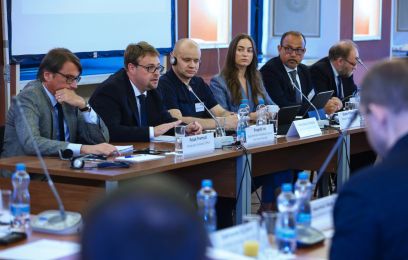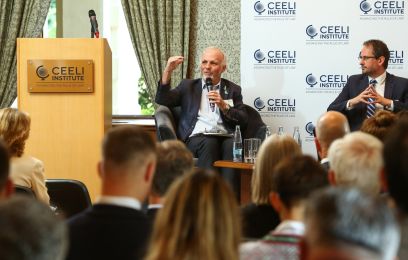
As the war in Ukraine grinds on, international legal experts continue to lay the groundwork for holding Russia to account when the fighting ends. One element of that preparation took place at Villa Grébovka last month, as 32 promising young Ukrainian lawyers participated in the CEELI Institute’s second edition of the summer school Legal Skills in a Time of War.
“Even if the war ends tomorrow and Ukraine wins, we will need to respond to the mass violations of human rights and humanitarian law that took place during the war,” European Court of Human Rights Judge Mykola Gnatovskyy told students during the two-week training. “The amount of work is enormous, and lawyers should be prepared to do this.”
Training young lawyers to assist in these efforts is essential, Gnatovskyy said, particularly given the complexity of the process. “Every state has a very clear and strong international obligation to organize its system in a way that it can deal with war crimes, because states have the primary responsibility for responding to any crime under international criminal law. War crimes would clearly belong there, by virtue of various international legal instruments, starting with the 1949 Geneva Convention.”
One of the biggest challenges is gathering evidence for such crimes, especially when they happen on a large scale. “It’s long, complicated, and success is not guaranteed,” Judge Gnatovskyy said. “But there is no choice, you have to deal with those cases, you have to investigate.
The first week’s docket was packed with developing essential lawyering skills, such as client-centered interviewing, cross-examinations of witnesses, case analysis, and learning how to deliver strong opening statements. Another theme central to the first week was trauma-informed lawyering and self-care for lawyers working with clients experiencing trauma.
Olivia Wilson-Bushell, a senior pro bono coordinator and attorney in the United Kingdom, explained that trauma-informed lawyering goes beyond the “default” method of lawyering; one cannot advise on the merits of a case and separate logic from emotion. In workshops, students practiced identifying trauma and adjusting their relationship with their clients to avoid re-traumatization, alleviate stress and anxiety, and make their clients feel comfortable.
Another week-one trainer, former President of the Special Tribunal of Lebanon and CEELI Board member Ivana Hrdličkova, shared her experience leading the special tribunal and crucial lessons she learned. When asked about Ukraine’s best options to achieve justice, Hrdličkova emphasized that the most essential aspect of any tribunal is the amount of financial, political, and judicial cooperation behind it. Additionally, the selection of judges and the quality of the defense are keys for credibility and legitimacy.
While the first week centered around essential trial advocacy skills, the second week was dedicated to transforming the students into formidable international lawyers.
Judge Keith Raynor, former Vice President of the Kosovo Specialist Chambers in The Hague and a former international prosecutor at the Extraordinary Chambers in the Courts of Cambodia, led things off with a discussion on jus ad bellum and the use of force in international law.
Throughout the course, the faculty kept participants busy with panels on accountability for Russia’s atrocities in Ukraine and lectures on international law related to war crimes, crimes against humanity, genocide, and the crime of aggression.
A special focus was on analyzing the Russian Federation’s arguments and past claims, such as the right to collective self-defense of self-declared “People’s Republics,” which required “special military operations.” Through interactive discussions, students learned why these approaches are problematic and unlawful under international law, and how to prosecute the crime of aggression. Students considered what crimes might be subject to prosecution and when, and who might be protected by immunity.
Participants will take these lessons home with them as they are the next generation who will grapple with justice and accountability in Ukraine for the many years to come. “Throughout the Summer School, we gained knowledge in crucial topics like trial advocacy, trauma-informed lawyering, and international criminal law. I'm grateful for the opportunity to have immersed myself in these critical subjects that are vital in today's world,” explained Solomiia Pelykh, a former student at the Ivan Franko National University of Lviv, now working as an assistant attorney in Lviv.
Beyond the rich academic experience, the two-week gathering at the Villa Grébovka created unique conditions for professional growth, healthy debates, and development of life-long connections. Valentyna Danyliuk, a master’s student at the National University of Kyiv-Mohyla Academy, shared that the connections made gave her “a newfound sense of empowerment and inspiration."
Ultimately, cooperation with the international community will be essential for legal justice in Ukraine. “The system is multifaceted; it’s not just at the domestic level or the international level,” concluded Judge Gnatovskyy. To navigate this complexity, “You need many qualified lawyers. This summer school is preparing some of them.”


